Blog posts tagged 4g
Five things 4G will do for your business
 4G, the new mobile technology that allows for superfast mobile internet connections, is just beginning to have an impact on the UK telecoms market.
4G, the new mobile technology that allows for superfast mobile internet connections, is just beginning to have an impact on the UK telecoms market.
However, although 4G has been talked about for several years now, many people are still in the dark about what it’ll do for their businesses. That’s why we’ve compiled these five key benefits:
- It lets you do more on the move.
- It’ll make remote working easier.
- It could cut your costs.
- It may boost your productivity.
- It’ll increase your mobile sales.
The key thing about 4G is that it really boosts the connection speed for mobile devices. That means you can do more on the move.
In fact, some 4G connections should offer speeds comparable to or faster than fixed-line broadband, which means tasks like working on shared documents, videoconferencing and more all become practical.
How to get 4GEverything Everywhere is the only company currently offering 4G mobile. It covers major UK cities. EE is the same company as T-Mobile andOrange, so if you have a mobile contract with them you may be able to move to 4G even if you're within your minimum contract period. O2 and Vodafone promise preferential 4G upgrades to some customers once their 4G networks become available later this year. |
Experts predict that 4G will eventually cover up to 99% of the UK population, which means even people living in rural areas will have a connection that’s fast enough to make remote working practical.
4G costs will drop as more mobile networks launch their 4G services. But 4G could trigger big savings in unexpected areas. As more employees are able to work remotely, you may find you can move to a smaller office or reduce your power bills.
4G will make it more practical to hold online meetings and use collaboration tools smoothly, which could result in less time spent travelling to meetings (and more time spent working).
Your customers will be using 4G too, which means they’ll find it easier and quicker to browse your website. That’ll encourage them to buy products on the move (if your website works well on mobile devices), increasing your sales.
Ultimately, 4G is an engine for economic growth. It’ll bring wide benefits helping companies to grow and encouraging investment in businesses from both the UK and abroad.
How 4G broadband will revolutionise business
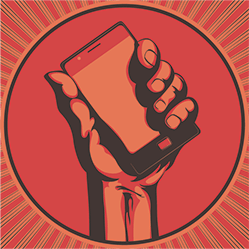 Since mobile phones first gained the capacity for internet browsing, they have become a priceless tool for business owners across the world. They keep you connected throughout the day, even when you travel around.
Since mobile phones first gained the capacity for internet browsing, they have become a priceless tool for business owners across the world. They keep you connected throughout the day, even when you travel around.
Most people are familiar with the term ‘3G’ by now (it’s the technology which powers most mobile internet access), but the idea of 4G may still baffle some.
Put simply, 4G is the fourth-generation communications technology which will allow much faster mobile internet connections. It’ll only be for mobile phones at first, but eventually laptops and portable gaming devices will benefit too.
Your 4G optionsEverything Everywhere is the only company currently offering 4G mobile. It covers major UK cities. EE is the same company as T-Mobile and Orange, so if you have a mobile contract with them you may be able to move to 4G even if you're within your minimum contract period. O2 and Vodafone promise preferential 4G upgrades to some customers once their 4G networks become available later in 2013. |
It's an advance in technology that could drastically change the way we carry out business. Here’s why:
1. Connect for less
4G will be fast enough to allow you to use voice over internet protocol (VoIP) software reliably, enabling you to make calls over the internet rather than using up your mobile network’s allowance of minutes.
You can do this via services like Skype or Viber (which also allows you to send text messages via mobile internet).
Mobile networks will probably change their tariffs as mobile VoIP takes off, but if you can get an unlimited data plan then you may never need to worry about exceeding your call allowance again.
2. Collaborate on the road
If you need to check documents outside of the office, it can currently take anything up to ten minutes to download each file you want to view. Hardly ideal if you’re trying to get things done!
4G will make this much faster. You can take advantage of it even more by implementing a cloud computing system to share documents and software.
For instance, inTechnology, which provides cloud services ranging from file-sharing to payment systems, predicts that this year will be the year businesses make the switch. Many small and medium-sized businesses are already beginning to do so.
3. Create your own hotspot
If you carry a laptop or tablet with you, you might be please to know that most smart phones can be turned into a wireless hotspot. This means you can connect any other wireless device to your phone and use your phone's data service to browse the internet.
This is ideal if you spend long periods of time on the road or between meetings. When you do get a moment you’ll be able to sit down at a computer and get straight to work - without having to look for free Wi-Fi or pay a separate fee for a dongle!
While it’s true you can do this with existing 3G networks, the extra speed promised by 4G makes portable hotspots a much more attractive and useful proposition.
Jordan Peck is a keen writer who writes about various topics including technology and business.
4G can really help your business, finds 4G network
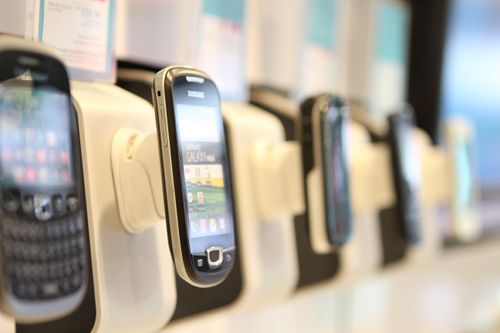
If you don't live in one of the cities where you can get a signal, news that 4G mobile is now available in the UK may not have made much of an impact on you. And even if you do live in an area that's covered, you could have been forgiven for losing interest once you saw how network Everything Everywhere (EE) has chosen to price its tariffs.
Significant 4G benefits
Your 4G optionsEverything Everywhere is the only company currently offering 4G mobile. EE is a new brand from T-Mobile and Orange, so if you have a mobile contract with them you may be able to move to 4G even if you're within your minimum contract period. O2 and Vodafone both promise preferential 4G upgrades to customers with certain mobile handsets once their 4G networks become available next year. |
EE has now released research into the business benefits of 4G. And they show a considerable upside to the technology, even when you allow for the fact that a 4G provider is never going to play down the possibilities of its service.
The survey examined how 4G is used by small and medium-sized businesses in countries where it's been available for a while. Some of the key findings were:
- 74% of firms using 4G in the US say it's helped them innovate and jump ahead of the competition. It seems particularly useful for companies with workers in the field. For instance, construction workers can use 4G to quickly send large amounts of information back to head office.
- Eight out of ten US firms with 4G say it helps them get more done on the move, and nearly half reckon it's actually saved them money by enabling flexible working so they can reduce office space.
- Small firms in the UK have high expectations of 4G. 59% expect it will help them increase productivity and 38% think it will improve staff well-being and motivation.
Interestingly, 4G also lies at the heart of some interesting innovations. The survey cites a CCTV company that's been able to use 4G to transmit footage instead of having to dig up streets to install cables. And a German car manufacturer is soon to launch a car with a 4G hotspot built in - so you can get connected as you travel.
Too early to switch
There is certainly demand out there for faster mobile connections. But for most companies, there's no compelling reason to switch yet. What's more, EE is the only network currently offering 4G at present. Once other providers enter the market next year there's an excellent chance the competition will force prices down.
For those two reasons, the wisest move for most companies is to wait and see how 4G pans out. Besides, the BBC found considerable variation in connection speeds - so there's no guarantee you'll see the full benefits yet.
Data limits could make 4G for business costly
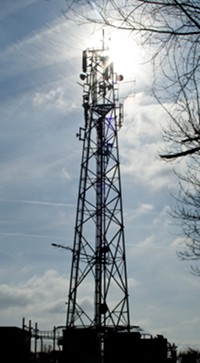 Everything Everywhere (EE), the UK's first 4G mobile network, has unveiled price plans in advance of its official launch tomorrow.
Everything Everywhere (EE), the UK's first 4G mobile network, has unveiled price plans in advance of its official launch tomorrow.
Although it promises download speeds up to five times faster than current 3G networks, the firm's data caps - which limit how much data you can download each month - may dissuade many businesses from signing up.
The entry-level EE business tariff is £35 a month (plus VAT). For that you'll get unlimited calls and text messages to standard UK mobile and landline numbers, plus 1GB (gigabyte) of mobile data. You may have to pay extra for a mobile handset, depending on which model you want.
You can increase your data cap: it's £40 for 4GB, £45 for 8GB or £50 for 16GB. If you hit the limit in any given month you'll either have to stop using the internet altogether or buy a data add-on. See full tariff details on the EE website.
Data pricing confusion
Data pricing is something of a thorny issue. You use up data whenever you view a web page, download an email or do anything online. But keeping track of how much you've used over a month is notoriously tricky - even on a 3G mobile.
The increased speed of 4G is going to make it harder. At 8Mbps (megabits per second, which is the lower end of the average speed range quoted by EE), you'd use your entire month's 1GB allowance in just over 17 minutes of sustained downloading.
Your 4G optionsEverything Everywhere is the only company currently offering 4G mobile. It launches on 31 October in ten UK cities. EE is a new brand from T-Mobile and Orange, so if you have a mobile contract with them you may be able to move to 4G even if you're within your minimum contract period. O2 and Vodafone both promise preferential 4G upgrades to customers with certain mobile handsets once their 4G networks become available next year. |
That may not be an entirely realistic scenario. We tend to use mobile internet in short bursts: downloading email on the train, looking up maps, and so on. And 3G mobile usage patterns show that most people on 3G networks don't even use 1GB in a month.
However, as a general rule, the faster a connection, the more data you download. What's more, the whole premise of 4G is that it's so quick and convenient that you can go online and do pretty much everything, everywhere. Hence the name.
With only 1GB of downloads to play with, you might find you have to fork out for extra data sooner than you'd hoped.
No other 4G choice ... for now
If your business is desperate to jump on the 4G train early, EE is your best option - because it's your only option.
The 4GB plan looks ok at £40 + VAT a month. It's not uncommon to spend that on a 3G service, and 4GB will at least give you some data freedom to explore the possibilities of 4G.
But before you leap in, check the small print: there's a 24-month minimum term on all business contracts. With other mobile networks racing to enter the 4G market next year, you might regret being locked in as competition hots up.
So, unless you're really desperate for 4G, it's probably a good idea to wait.
- Be one of the first to get iPhone 5 with 4G
- 4G mobile broadband tested
- Finding the right mobile internet device
Mobile phone mast image from barryskeates on Flickr.
Be one of the first to get iPhone 5 with 4G
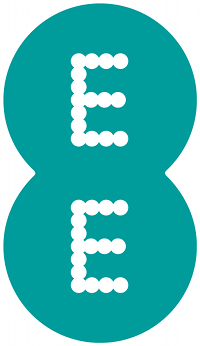 Last week's iPhone 5 launch was thin on surprises, but many will have been excited to see that the new iPhone includes 4G connectivity. This new mobile internet internet standard allows for much faster connections than the current 3G networks.
Last week's iPhone 5 launch was thin on surprises, but many will have been excited to see that the new iPhone includes 4G connectivity. This new mobile internet internet standard allows for much faster connections than the current 3G networks.
We tested a 4G connection earlier this year and we were impressed. It managed to beat most broadband connection speeds convincingly, even from the top deck of a number 25 bus.
4G is coming soon
Back then it looked like we wouldn't see 4G in the UK till next year. But things have changed since, and EE - a new network from the same people who run Orange and T-Mobile - is set to launch 4G in selected UK cities before the end of the 2012. Superfast mobile connections could be closer than you think.
In a bit of a double blow to the other UK mobile networks, not only is EE launching 4G first, but it also looks like it'll be possible to get an iPhone 5 on the new network pretty much from day one.
Sign up now for a 4G iPhone
If you do want to be a 4G trailblazer with an iPhone 5 the advice is to move quickly. Pre-order your iPhone 5 now with Orange or T-Mobile and you'll be able to move to a 4G EE contract once the network launches properly. And - of course - in the meantime you'll be able to use your shiny new iPhone 5 on the Orange or T-Mobile networks.
You will have to lock yourself into a two-year contract (at a minimum of £36 a month), and pay anything up to £269 up front for the phone, depending which model you want and which monthly plan you choose.
It's also not clear exactly how much an EE tariff will cost, although you should be able to switch without penalty and it sounds like prices should be fairly comparable.
In all, if you want to be at the forefront of mobile internet access then this doesn't look to be a bad way of going about it.
(Before you order, make sure you have a read of the EE website. At launch it looks like 4G will only be available in London, Birmingham, Leeds, Cardiff, Bristol, Edinburgh, Manchester, Liverpool, Glasgow and Sheffield, with more cities added by the end of the year.)
4G mobile speeds - next-gen mobile broadband tested
 Your mobile phone almost certainly has 3G mobile broadband built in. It’s the technology that enables you to send and receive emails, view web pages and download Google Maps on the move.
Your mobile phone almost certainly has 3G mobile broadband built in. It’s the technology that enables you to send and receive emails, view web pages and download Google Maps on the move.
But there’s something faster on the horizon. 4G is the next generation of mobile internet connection. It promises greater reliability and much, much faster speeds. If it lives up to the hype, it could change the face of mobile working.
4G mobile data in action
While some countries – including the US, Germany and Sweden – have already begun rolling out 4G networks, we’re somewhat behind in the UK. However, O2 is running a trial of the system in London. I’ve been lucky enough to be a part of it, and so far my experiences suggest 4G broadband really could revolutionise mobile internet access.
With only 25 masts around London, O2’s 4G coverage is hardly ubiquitous. But then it is a just a trial. And when you’re in a coverage area, the access speeds are superb.
To use the trial, I had to connect via a 4G dongle, which plugs in to my laptop. I first tried it in a McDonald’s near King’s Cross station.
Initially I was connected at a download speed of over 13 megabits (Mbps) per second and an upload speed of around 0.5Mbps. The average speed of a home broadband connection is a little over 7Mbps, so that didn’t seem too shabby – although it was a long way off the theoretical maximum of 150Mbps or so.
4G mobile speeds on the move
Still, I knew I could do better, so I headed out to try some different locations. From the top deck of a number 25 bus I maxed out at 15.5Mbps down and – surprisingly - 25Mbps up.
I switched to the pavement just in time to catch a torrential rain shower, and after sheltering my laptop and dodging raindrops, I took shelter in a pub just off Oxford Street. Sat in the window and sipping a cup of tea (honest!) I hit the jackpot with a download speed of 40Mbps and 23Mbps upload.
That’s really fast (faster than some BT Infinity broadband packages), but to illustrate just how fast, I tried a few tests. A video call through Skype barely warmed up the connection, so I fired up the BBC’s iPlayer.
Streaming video requires a fast connection, yet I managed to stream four different programs simultaneously, without any slowdown, pauses, or interruptions to the video at all. Can you do that with your home broadband connection?
Strong signal = fast 4G
So, there you go. If you’re looking for a fast 4G connection in central London, you could do a lot worse than head for the pub.
But seriously, my brief experiences with 4G technology certainly suggest it has the potential to put an end to today’s mobile internet frustrations.
Of course, there are some caveats. My sojourn found excellent speeds where the signal was strong. But maintaining a strong signal across the UK is going to require a fast rollout of new equipment from the mobile operators. One of the issues with 3G is its patchy coverage in rural areas. There’s no guarantee 4G will be any different.
Network operators will also face challenges depending on which parts of the radio spectrum they use. The available bandwidth is much higher at some frequencies than others, and the frequencies used also affect the strength of connections inside buildings.
We all need 4G mobile speeds
However, the ability to have genuinely fast internet access on a laptop, tablet or mobile phone is going to change how we all use the internet and do business. It is certainly going to drive more business into the mobile environment.
For example, Timico (the company I work for), gives its sales force iPads so they can demonstrate our applications and customer portal. An iPad combined with a 40Mbps suddenly becomes a low-cost teleconferencing system than you can use anywhere.
And 4G can provide a workable backup to the fixed line connection at your office, so the chance of being affected by an internet connection outage will drop considerably.
Everything about my experience suggests 4G could be a game-changer. Now we just need to get on and roll it out across the country!
- Finding the right mobile internet device
- Are tablet computers right for business?
- Mobile internet access explained
Trefor Davies is chief technology officer at Timico. This post was adapted from a post on Trefor’s own blog.
Why are there so many different connectors?
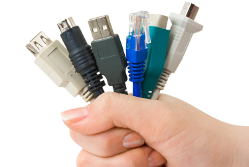 If you were listening to Radio 4's Today Programme this morning you might have heard the BBC's technology correspondent Rory Cellan-Jones attempting to broadcast live from Barcelona over a state of the art 4G mobile phone connection.
If you were listening to Radio 4's Today Programme this morning you might have heard the BBC's technology correspondent Rory Cellan-Jones attempting to broadcast live from Barcelona over a state of the art 4G mobile phone connection.
There’s a big mobile technology conference happening in Barcelona at the moment and 4G is the 'next generation' mobile internet connection, promising speeds that'll eclipse our existing 3G phones. However, it wasn't this bleeding edge technology that stymied the BBC expert's attempts to broadcast live from Barcelona. It was bad design.
To accomplish the broadcast, Cellan-Jones needed to plug both a USB microphone and a 4G dongle into his Apple Mac computer. But – as he revealed on Twitter – the two plugs were too close together to connect them both at once. He ended up making the broadcast over a hotel’s wireless network.
Most of us will sympathise with this predicament – we’ve all probably left behind a crucial cord, charger or connector when travelling with technology, or struggled to squeeze one connector in when it's tight up against another. Embarrassingly, when I first started using a laptop I went through a phase of finding myself in the office with the charger at home (or vice-versa).
But does this highlight a crucial failing of technology? With so many different connectors and sizes of plug (especially when it comes to power cables and transformers, which all seem to be different), isn’t it time for better standardisation?
Listen to the segment for yourself on the BBC website. The 4G broadcast starts at around 1 hour 44 minutes in.
Has a forgotten charger, cable or connector ever left you in hot water?



